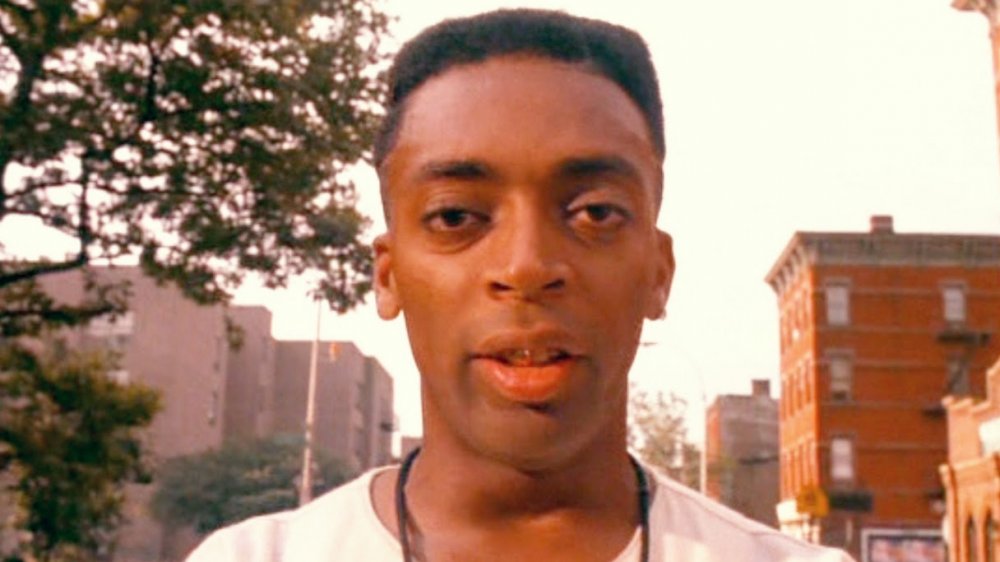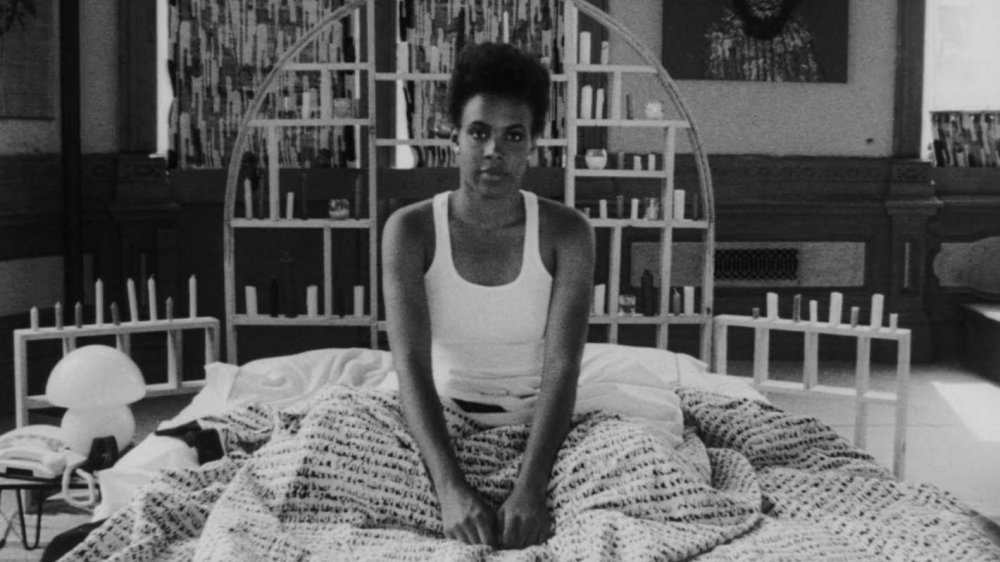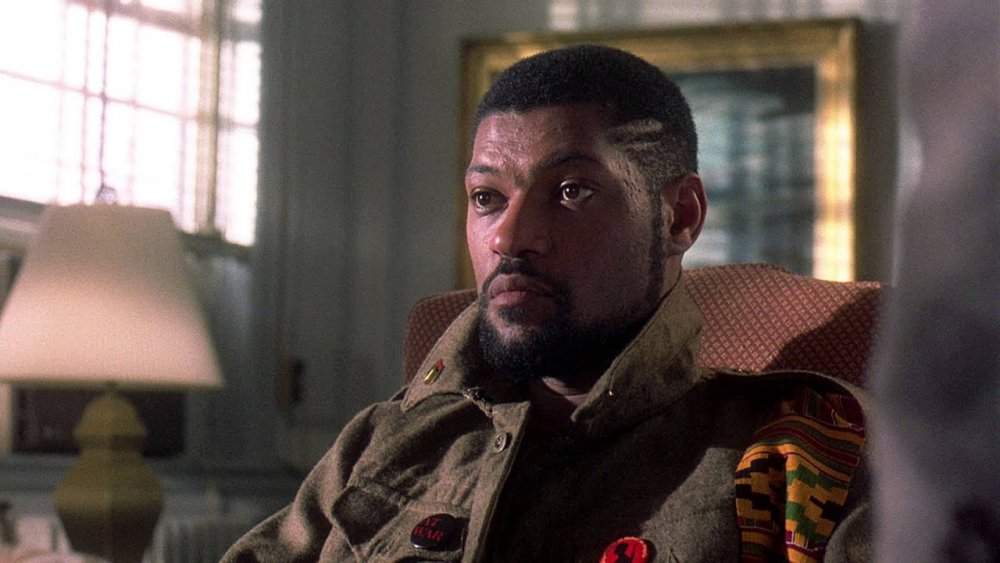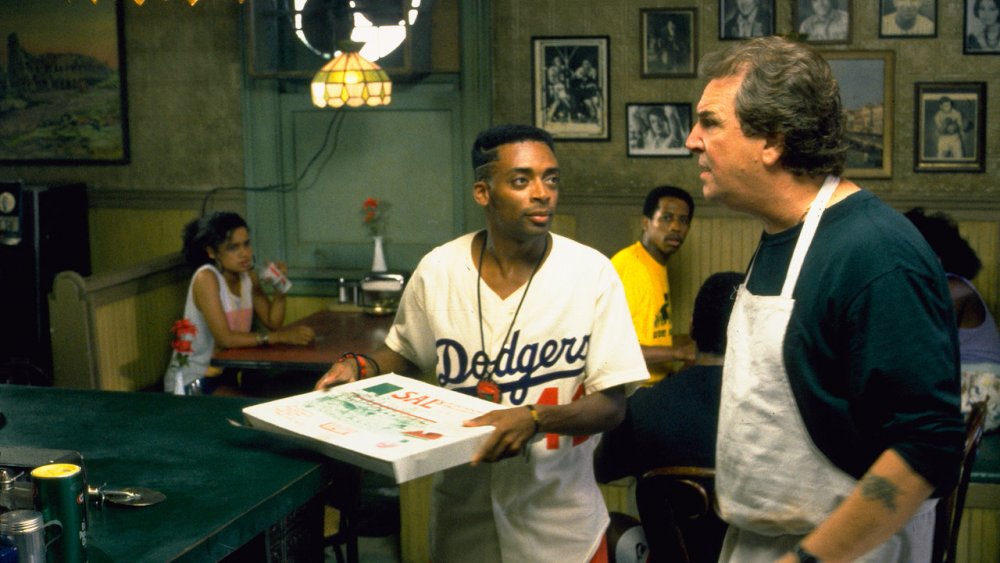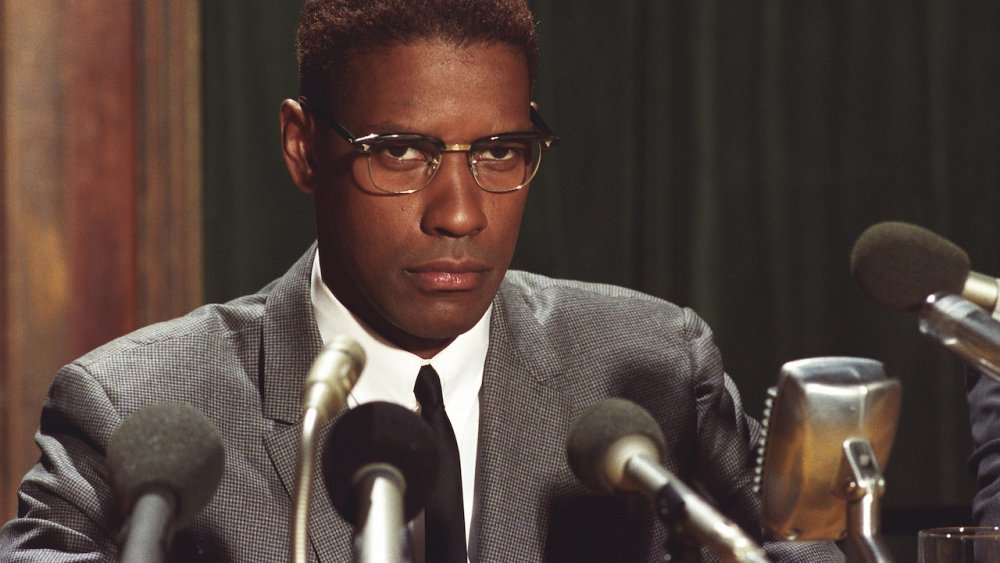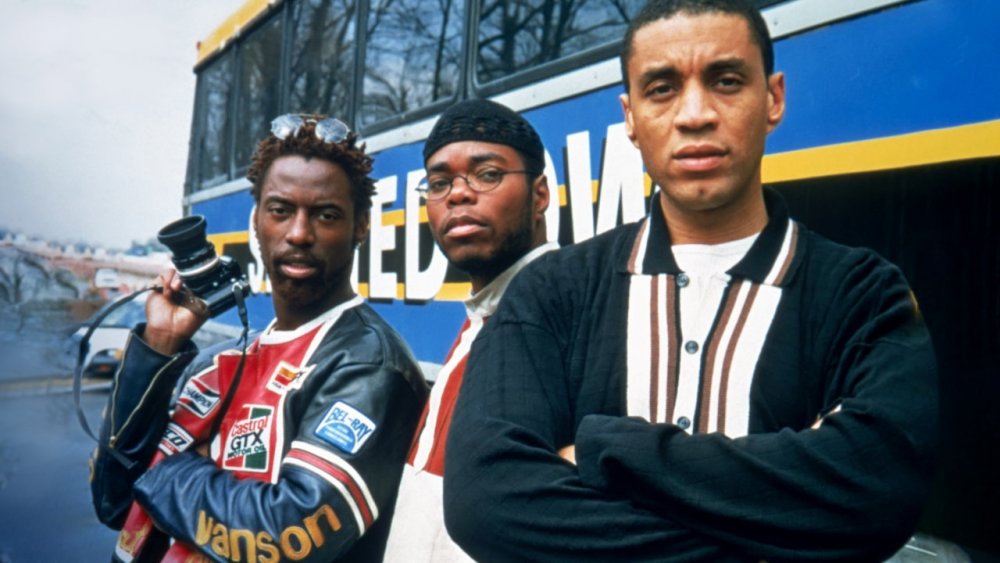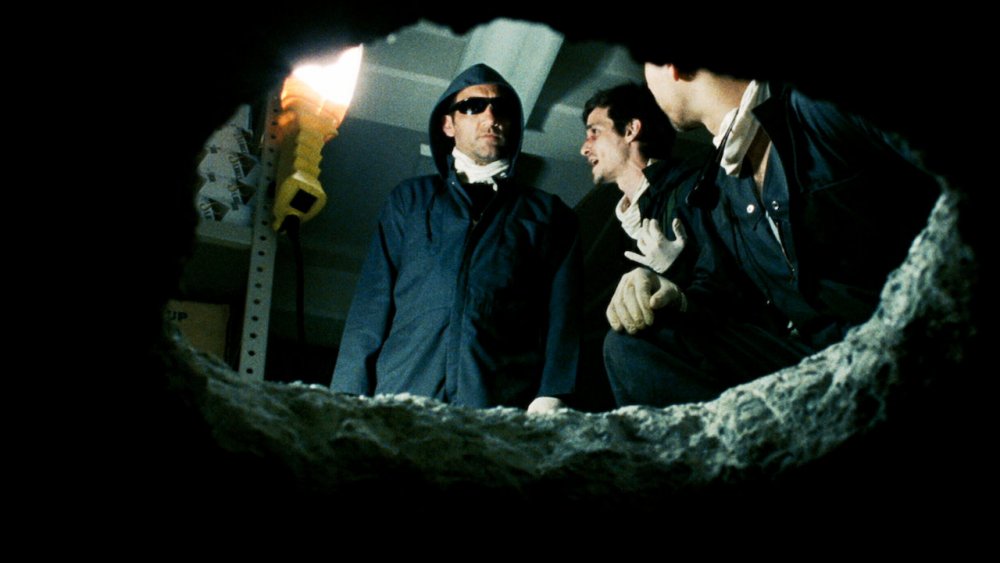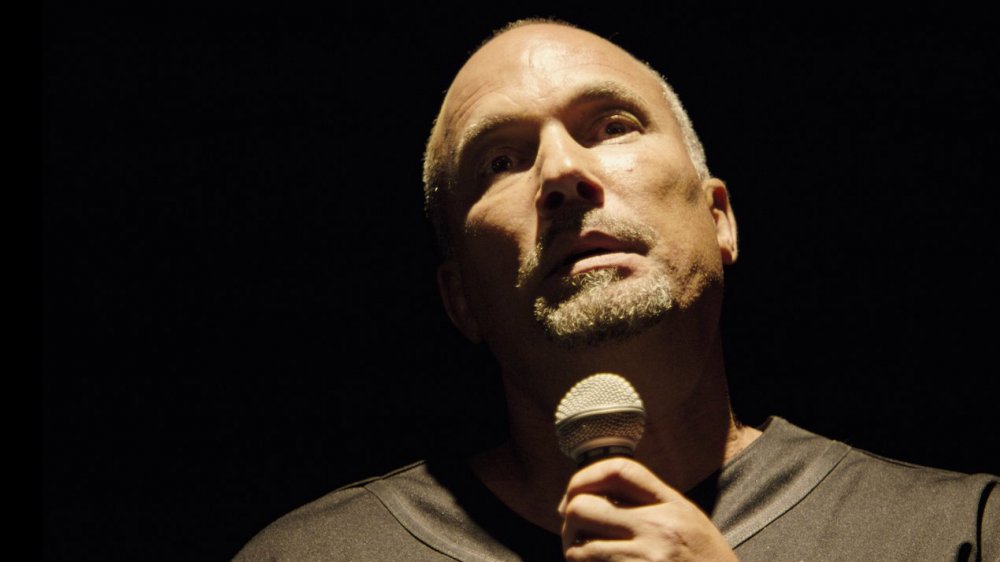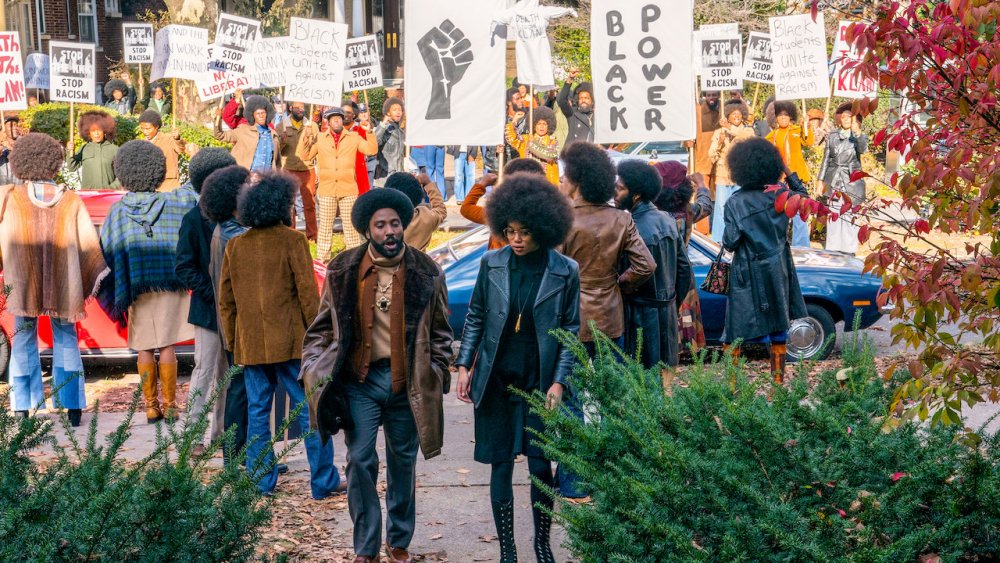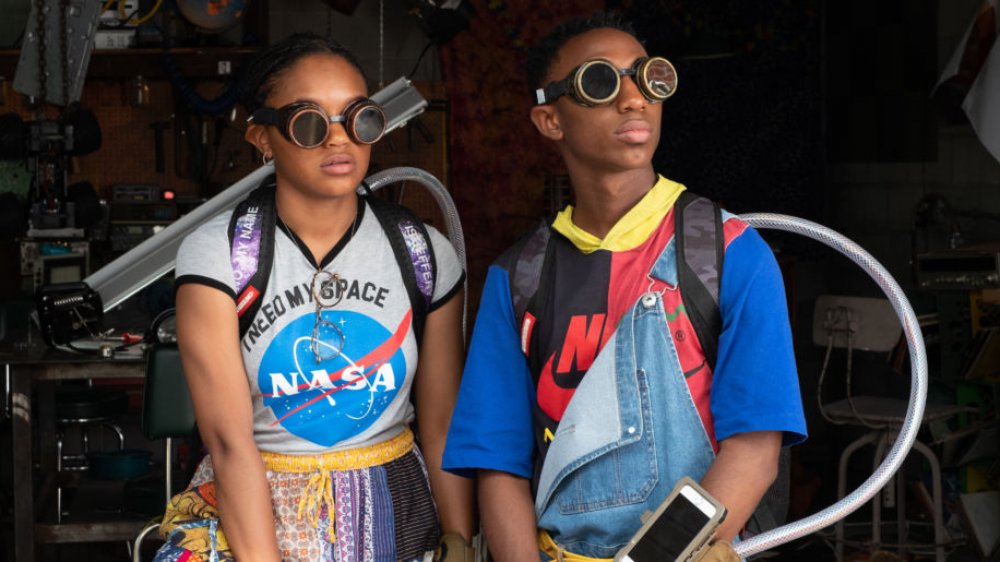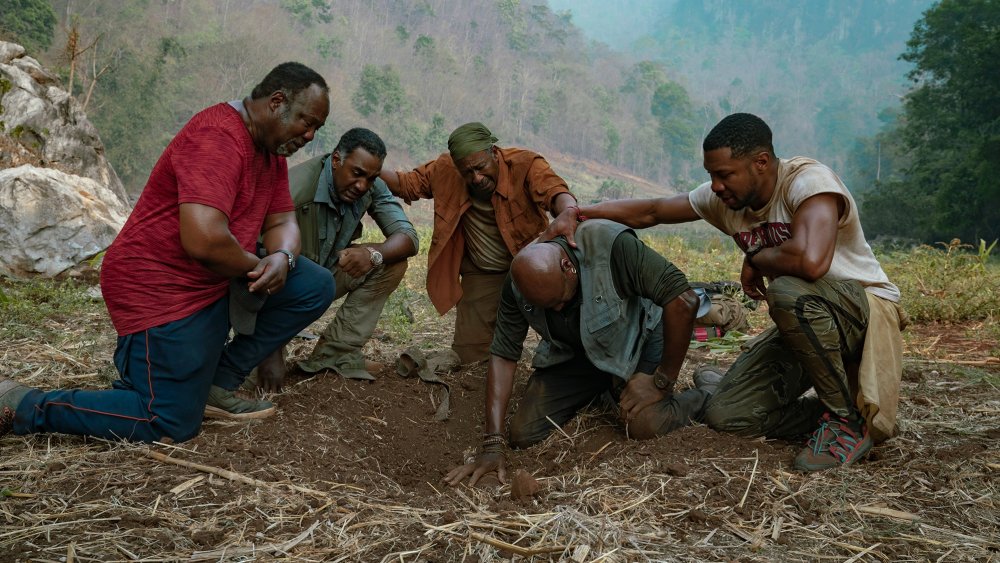Every Spike Lee Film You Can Watch On Netflix Right Now
This content was paid for by Netflix and created by Looper.
Spike Lee isn't a film icon because of what he has to say. It's how he says it. Sure, the veteran writer-director-actor has made a name for himself with his unflinching and nuanced looks at black life in America, but his films are about so much more than social issues. They're about people. They're about communities. They're about love and strife and movies themselves. They're not political screeds, they're stories.
All kinds of stories, too. While most filmmakers seem happy to stick within one or two genres, one of the things that makes Spike Lee so exciting is that he rarely, if ever, repeats himself. Just look at his Netflix offerings: Among them, you'll find a romantic comedy, a biopic, a heist movie, a war flick, a musical, a teenage-driven sci-fi film, a stage play, and more. When it comes to Spike Lee's filmography, there really is something for everyone.
And yet, as different as Lee's films are from one another, they're all united by a singular, undeniable voice. Lee's greatest strength as a filmmaker isn't his politics. It's his willingness to experiment, to break the rules, and to challenge the status quo in his search for truth. Need more convincing? These films will show you exactly what we mean.
She's Gotta Have It
This is the one that started it all. Released in 1986 and produced on a paltry $175,000 budget, She's Gotta Have It is Spike Lee's first feature film, and watching it, it's no surprise that he became a household name. Technically, She's Gotta Have It is a romantic comedy, but don't look for a familiar formula here. For one, She's Gotta Have It is set in Fort Greene, Brooklyn, a vibrant and diverse community that's rarely represented onscreen. For another, She's Gotta Have It's main character, Nola, doesn't believe in monogamy. She's overtly and unabashedly sexual, and lives life on her own terms.
Even today, a female-focused, sex-positive point of view is rare in film, and it makes watching Nola's tussles with her three very different lovers endlessly fascinating to watch. Her most conventional romcom partner, Jamie, dresses well and is polite, but kind of boring. Greer Childs, a model, is self-absorbed to the point of hilarity. Lee himself plays Mars Blackmon, who's a funny guy but certainly isn't long-term relationship material.
Not all of She's Gotta Have It has aged well, especially one excruciating scene that Lee calls his biggest regret as a filmmaker. Still, you can see all of the hallmarks of Lee's later career here. The focus on community, the canny stylistic flourishes like the moment in which the black and white film momentarily switches over to color, and the intimacy of the production (Lee's father, Bill, provided the soundtrack) would, over time, become some of Lee's hallmarks. It's hard to imagine a better debut. In addition, if you like what you see here, Lee also turned She's Gotta Have It into a TV comedy, the first two seasons of which just happen to be Netflix exclusives.
School Daze
School Daze is a college sex comedy. It's a musical. Set at Mission College, a historically black college in Atlanta Georgia, School Daze brings tensions over imperialism, class, and prejudice within the black community to the forefront.
On one side of School Daze, you have the light-skinned, straight-haired students who pledge the Gamma Phi Gamma frat and Gamma Ray sorority, as epitomized by Breaking Bad and The Mandalorian's Giancarlo Esposito. On the other are Lawrence Fishburne's Dab and the rest of the students who have darker skin and kinkier hair and are more devoted to political causes than, say, homecoming. It's a canny subversion of the normal snobs-versus-slobs tropes that define the college comedy genre.
Then again, subversion is what School Daze is all about. The film's standout musical number, "Straight and Nappy," mimics the rhythms of West Side Story, even while using the Broadway-style choreography to expose the prejudices and stereotypes and plague the black community. Lee makes it easy to get caught up in School Daze's juvenile power struggles, only to turn around and point the finger at the audience for ignoring larger issues like Apartheid-striken South Africa. Like many of Lee's films, School Daze bites off a little more than it can chew, but what does work works so well you probably won't mind.
Do the Right Thing
This is it. This is the big one. While She's Gotta Have It and School Daze put Spike Lee on the map, it was Do the Right Thing that marked him as a directorial superstar. It scored two Academy Award nominations, including one for Lee for Best Original Screenplay, topped critics' best-of lists as 1989 came to a close, and is now considered one of the most important American movies ever made.
For all that, Do the Right Thing is a pretty simple story. It's a hot summer day in the Bedford–Stuyvesant neighborhood of Brooklyn, and passions are running high. Throw in simmering racial strife between the local Italian-owned pizzeria and Bed-Stuy's mostly black residents (although in Do the Right Thing, there's plenty of racism to go around), and you have a powder keg that's just waiting to explode.
Eventually, a scene of strikingly relevant police brutality lights the fuse, sparking a riot that will live forever in cinematic infamy. Do the Right Thing can be a challenging film — it raises difficult questions, but offers no answers — but it's also a lively one, full of colorful and interesting characters, each of whom has plenty of quirks and foibles. Honestly, the feature film debuts of Martin Lawrence and Rosie Perez are just icing on the cake. Do the Right Thing is a classic for a reason, and right now is the perfect time for a re-watch.
Malcolm X
Spike Lee's Malcolm X shouldn't have happened. In fact, it almost didn't. It had been sitting around in script form for over 20 years. Originally, a different (and white) director was attached. Before filming started, activists took to the streets to protest the production of the film out of fear that Lee was going to misrepresent the civil rights movement leader on the big screen. The film ran millions of dollars over budget, forcing the bond company financing the film to lock Lee out of the editing room, and was only saved when wealthy black celebrities gave Lee the funds he needed to finish.
And yet, for all of the hubbub, Malcolm X is a fairly conventional biopic. It has all of the sweeping grandeur of the best in the genre, and like those, it's anchored by its star, Denzel Washington, who turns in one of his best performances in a career full of great ones. Malcolm X was a controversial figure, but Malcolm X isn't a controversial movie. It hits all of the major beats of Malcolm X's life, including his prison stint, his conversion to Islam, and his assassination, and handles sensitive material with restraint and grace.
It's also full of great acting by the likes of Angela Bassett and Delroy Lindo, and while Washington lost the Best Actor Oscar to Al Pacino for The Scent of a Woman, the film was added to the Library of Congress in 2010 in honor of its cultural significance. Not bad for a movie that almost didn't see the light of day.
Get on the Bus
Spike Lee's movies have always spoken to the political moment in which they were made, but none have done so quite as directly as his 1996 feature Get on the Bus. The movie, which tells the story of a group of African-American men making their way from Los Angeles to Washington, D.C. for the Million Man March, debuted on the historic event's first anniversary.
That's a remarkably quick turnaround time, but while Get on the Bus feels urgent, it doesn't feel rushed. Part of that is the way that Lee wisely keeps the scope small, shooting on 16 millimeter film and video, and confining lots of the action to the bus itself. As a result, it's up to the characters to deliver the complexity. Isaiah Washington and Harry Lennix play a gay couple whose relationship is on the verge of collapse. Andre Braugher is the homophobic actor who makes their lives miserable. Gabriel Casseus appears as a former gangbanger who found religion in prison, while Roger Guenveur Smith portrays a light-skinned police officer who needs to earn the trust of his fellow passengers.
It's a cast of characters full of contradictions, prejudices, and differing viewpoints, and the potent mix provides all the drama that's needed as the crew makes their way across the country. Get on the Bus doesn't shy away from some of the real-life controversies surrounding the March (although, like the Million Man March itself, its lack of female characters is notable), and while it's one of Lee's more minor films, it's an excellent testament to his ability to examine larger social issues through a smaller, more intimate lens.
Inside Man
Sometimes, a person just wants to let loose and have fun, and it sure feels like Inside Man is Spike Lee having a blast. Inside Man isn't another one of the racially driven character pieces that Lee is known for. It's a straight-up heist film, with all of the goofy characters and over-the-top plot twists that that implies.
In Inside Man, Clive Owen stars as Dalton Russell, a criminal mastermind who takes the occupants of a Manhattan bank hostage as part of his plan to commit the perfect crime. NYPD detective Keith Frazier, played by Denzel Washington, is his foil: a man who just wants to make sure the hostages get out safe, so everyone can go home happy. Christopher Plummer shows up as the bank's founder (who, naturally, has a terrible secret), Jodie Foster complicates the proceedings as a "fixer" with ulterior motives, and Willem Dafoe and Chiwetel Ejiofor have supporting parts as Frazier's fellow cops.
Saying anything else would spoil Inside Man's twists and turns, robbing the movie of most of its fun. No, you won't find much of Lee's politics here (although a brief sequence featuring a fake video game, Gangstas iz Genocide, serves as some cutting satire and provides one of the movie's biggest laughs), but his skill as a filmmaker is on full display, and his clear love for the city of New York is downright infectious.
Rodney King
Spike Lee might've directed Rodney King, but it's really Roger Guenveur Smith's show. If you've seen any of Lee's work, you'll recognize Smith immediately — he played Smiley in Do the Right Thing, Yoda in School Daze, Rudy in Malcolm X, and has appeared in plenty of other Spike Lee joints — but here, he's the only actor on stage. Rodney King is a one-man show that Smith created in 2012 and performed regularly through 2017, and which Lee managed to film in 2014, preserving it for posterity.
Good thing he did, too, because while Rodney King isn't always easy to watch, it's one heck of a performance. Using a mix of rhythmic poetry, Smith's personal recollection of the 1992 Los Angeles riots, and King's own words, Smith interrogates the man behind the symbol. Yes, Smith explores the social and political ramifications of King's infamous beating at the hands of the LAPD, but he's also acutely interested in King himself. King wasn't just a one-time victim. He was a person who lived an interesting and complicated life, and Smith has plenty to say about it.
At some point, Hollywood will inevitably make a big, lavish Rodney King biopic. It needn't bother. Rodney King is a small production, but its modesty makes it all the more powerful. It's hard to imagine King's life, as flawed as it was, getting a better tribute than this one.
BlacKkKlansman
The premise for BlacKkKlansman sounds like a joke. A black man goes undercover with the KKK? How does that work?
And yet, not only is BlacKkKlansman a serious movie (albeit one with Spike Lee's finely honed sense of satire woven in), but it's based on a true story. In the '70s, black police officer Ron Stallworth really did infiltrate the KKK by posing as a white man on the telephone, sending a white colleague to take his place for in-person meetings, and really did interact with high-ranking Klan authorities, including KKK Grand Wizard David Duke.
BlacKkKlansman takes a number of liberties with historical fact, of course — as depicted in the movie, much of Stallworth's personal life is fictionalized, his white partner has never been officially identified, and the KKK's bomb plot was invented for the film — but it's still a story that's as absurd as it is thrilling, and it proves that Lee is still at the top of his game.
See You Yesterday
Lee doesn't just direct movies. He produces them, too. Take See You Yesterday, for example. While the movie was co-written and directed by Stefon Bristol, Lee's fingerprints are all over it. A racially focused spin on a formula that plays on established genre tropes and intimate character relationships in order to comment on larger social issues? Yep, that's a Spike Lee joint in everything but name.
In the case of See You Yesterday, the inspiration is clearly Back to the Future (Michael J. Fox even makes a cameo), and the issue at hand is Black Lives Matter. High schoolers C.J. Walker and Sebastian Thomas are geniuses — they built a time machine for their science fair, for goodness' sake — but when police murder C.J.'s brother, not even time travel can prevent the cycle of violence from repeating itself. Not that C.J. stops trying, of course. Racism might be an institutional problem, not a scientific one, but even as the time loops pile up, the young inventor never gives up hope that she can make the world a better place.
From the Brooklyn-based setting to the nuanced examination of police brutality, fans of Lee's films will find a lot to like here, although that's not to say that Bristol doesn't bring his own flair to the project. The performances from See You Yesterday's two young leads deserve particular praise. They carry the movie. It wouldn't work without them.
Da 5 Bloods
What does a Spike Lee joint look like when the director is entirely unrestrained? Probably a lot like Da 5 Bloods. While Da 5 Bloods has a wild and intriguing premise — four black Vietnam veterans head back to a former battlefield in search of both their commanding officer's corpse and the gold he left behind — the logline only scratches the surface. This is, arguably, the purest, most confident Spike Lee film yet. It's the kind of movie only he could make.
For one, Da 5 Bloods drips with Lee's signature style. It features cutaways to real-life events that span everything from the Kent State massacre to a Trump rally. In Da 5 Bloods' dreamlike flashback scenes, the four main actors, who are all in their 60s, play themselves at a younger age without the aid of makeup or digital de-aging effects. Frequent Lee collaborators make regular appearances, including Delroy Lindo, who has one of the film's main roles.
Da 5 Bloods doesn't shy away from politics, either. If anything, it attacks them head-on. Da 5 Bloods tackles issues like PTSD, Black Lives Matter, male friendships, and the cyclical nature of America's industrial-military complex. It's also an action movie, a western, and a war film. It is unfocused, very long, and prone to sudden shifts in tone. It's also, quite simply, a masterpiece, and an excellent argument for why Spike Lee remains one of the most important filmmakers working today.
